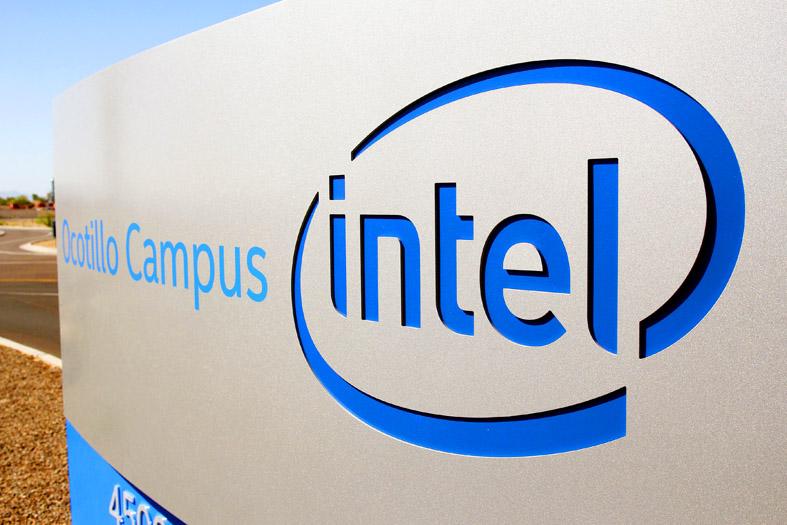Intel Corp on Wednesday dodged another multibillion-dollar damage award after a federal jury in Texas cleared it of claims it was infringing patents formerly owned by NXP Semiconductors NV on ways to speed up computers.
Intel does not infringe two patents owned by closely held VLSI Technology LLC, according to the federal jury in Waco, Texas. The trial was held in the same courthouse where a different jury last month told Intel to pay VLSI US$2.18 billion over other patents.
This was the second of three trials in suits VLSI lodged against Intel over patents that until early 2019 were owned by Dutch chipmaker NXP Semiconductors. A third trial, also before US District Judge Alan Albright, is scheduled to begin in June.

Photo: Reuters
In the most recent trial, VLSI was seeking US$3 billion in damages, saying the inventions were critical to Intel’s ability to make chips faster and with fewer energy requirements. That is more than 3,000 times what the patents were valued at in past acquisitions, Intel’s lawyers said.
Intel denied using any of the inventions, saying its own engineers have spent decades developing the chips that are used in everything from laptops to military fighter planes. It also said that the patents did not cover new ideas even two decades ago, when they were issued.
VLSI was seeking damages for a period beginning March 1, 2019, just before the suit was filed. One of the patents, issued in 2002, expired in November last year, while the other was issued in 2003 and expires next month, according to data compiled by Bloomberg Law.
Intel reported US$20.9 billion of net income on US$77.9 billion of revenue last year.
VLSI was created in 2016 by the Softbank Group Corp-owned Fortress Investment Group, according to an antitrust lawsuit Intel and Apple Inc filed against Fortress.
Fortress has “deployed patents in waves of lawsuits against their targets without regard for the merits of the claims,” Intel and Apple said in the complaint, which is pending in a federal court in California.
A federal judge had initially tossed the antitrust case, but Apple and Intel amended their complaint a week after the US$2.18 billion verdict, arguing that trial and VLSI’s demand for billions more over other patents is evidence of Fortress’ anticompetitive activities.
Fortress is to respond by Monday.
VLSI has no products and its only potential revenue is its litigation against Intel. VLSI lawyer Morgan Chu of Irell & Manella told the jury not to be distracted by that issue.

WEAKER ACTIVITY: The sharpest deterioration was seen in the electronics and optical components sector, with the production index falling 13.2 points to 44.5 Taiwan’s manufacturing sector last month contracted for a second consecutive month, with the purchasing managers’ index (PMI) slipping to 48, reflecting ongoing caution over trade uncertainties, the Chung-Hua Institution for Economic Research (CIER, 中華經濟研究院) said yesterday. The decline reflects growing caution among companies amid uncertainty surrounding US tariffs, semiconductor duties and automotive import levies, and it is also likely linked to fading front-loading activity, CIER president Lien Hsien-ming (連賢明) said. “Some clients have started shifting orders to Southeast Asian countries where tariff regimes are already clear,” Lien told a news conference. Firms across the supply chain are also lowering stock levels to mitigate

IN THE AIR: While most companies said they were committed to North American operations, some added that production and costs would depend on the outcome of a US trade probe Leading local contract electronics makers Wistron Corp (緯創), Quanta Computer Inc (廣達), Inventec Corp (英業達) and Compal Electronics Inc (仁寶) are to maintain their North American expansion plans, despite Washington’s 20 percent tariff on Taiwanese goods. Wistron said it has long maintained a presence in the US, while distributing production across Taiwan, North America, Southeast Asia and Europe. The company is in talks with customers to align capacity with their site preferences, a company official told the Taipei Times by telephone on Friday. The company is still in talks with clients over who would bear the tariff costs, with the outcome pending further

Six Taiwanese companies, including contract chipmaker Taiwan Semiconductor Manufacturing Co (TSMC, 台積電), made the 2025 Fortune Global 500 list of the world’s largest firms by revenue. In a report published by New York-based Fortune magazine on Tuesday, Hon Hai Precision Industry Co (鴻海精密), also known as Foxconn Technology Group (富士康科技集團), ranked highest among Taiwanese firms, placing 28th with revenue of US$213.69 billion. Up 60 spots from last year, TSMC rose to No. 126 with US$90.16 billion in revenue, followed by Quanta Computer Inc (廣達) at 348th, Pegatron Corp (和碩) at 461st, CPC Corp, Taiwan (台灣中油) at 494th and Wistron Corp (緯創) at

NEGOTIATIONS: Semiconductors play an outsized role in Taiwan’s industrial and economic development and are a major driver of the Taiwan-US trade imbalance With US President Donald Trump threatening to impose tariffs on semiconductors, Taiwan is expected to face a significant challenge, as information and communications technology (ICT) products account for more than 70 percent of its exports to the US, Chung-Hua Institution for Economic Research (CIER, 中華經濟研究院) president Lien Hsien-ming (連賢明) said on Friday. Compared with other countries, semiconductors play a disproportionately large role in Taiwan’s industrial and economic development, Lien said. As the sixth-largest contributor to the US trade deficit, Taiwan recorded a US$73.9 billion trade surplus with the US last year — up from US$47.8 billion in 2023 — driven by strong